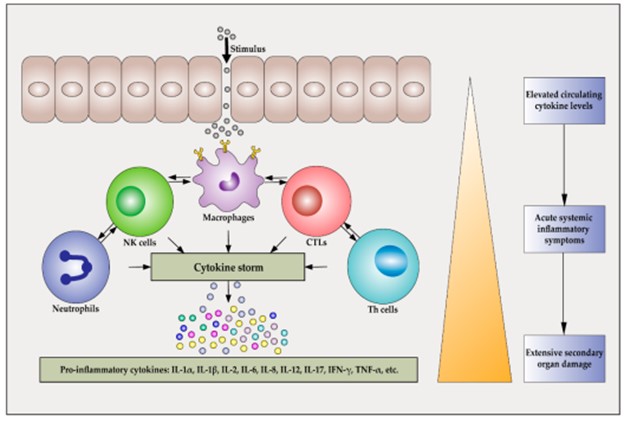What is the function of inflammatory cytokines released during the early response to bacterial infection?
Enhancing the phagocytosis of pathogens and disrupting the infection
Attacking invading pathogens
Initiating cell recruitment and local inflammation
Secreting antibodies to neutralize pathogens .
The Correct Answer is C
Inflammatory cytokines released during the early response to bacterial infection play a crucial role in initiating cell recruitment and local inflammation 1.
They induce the expression of adhesion molecules in endothelial cells and promote the recruitment of neutrophils to the site of inflammation 1.

Choice A is incorrect because while inflammatory cytokines may enhance phagocytosis, they do not directly disrupt the infection.
Choice B is incorrect because inflammatory cytokines do not directly attack invading pathogens.
Choice D is incorrect because inflammatory cytokines do not secrete antibodies to neutralize pathogens.
Nursing Test Bank
Naxlex Comprehensive Predictor Exams
Related Questions
Correct Answer is A
Explanation
The body regulates blood pH through several mechanisms, including chemical buffers, the respiratory system, and the urinary system.
The respiratory system can adjust blood pH by changing the rate of respiration to remove or retain CO2.
When there is excess acid in the blood, the respiratory rate increases to remove more CO2, which helps to raise blood pH.
Choice B is incorrect because decreasing the respiration rate would retain CO2, which would lower blood pH.
Choice C is incorrect because increased water intake would not directly affect blood pH levels.
Choice D is incorrect because decreased water intake would not directly affect blood pH levels.
Correct Answer is B
Explanation
The proximal tubule is responsible for reabsorbing all the nutrients and most of the water.
Choice A is incorrect because the distal tubule is not primarily responsible for reabsorbing ions, water and nutrients.
Choice C is incorrect because the glomerulus is responsible for filtering fluid and solutes out of the blood to form a glomerular filtrate.
Choice D is incorrect because the Loop of Henle is not primarily responsible for reabsorbing ions, water and nutrients.
Whether you are a student looking to ace your exams or a practicing nurse seeking to enhance your expertise , our nursing education contents will empower you with the confidence and competence to make a difference in the lives of patients and become a respected leader in the healthcare field.
Visit Naxlex, invest in your future and unlock endless possibilities with our unparalleled nursing education contents today
Report Wrong Answer on the Current Question
Do you disagree with the answer? If yes, what is your expected answer? Explain.
Kindly be descriptive with the issue you are facing.
